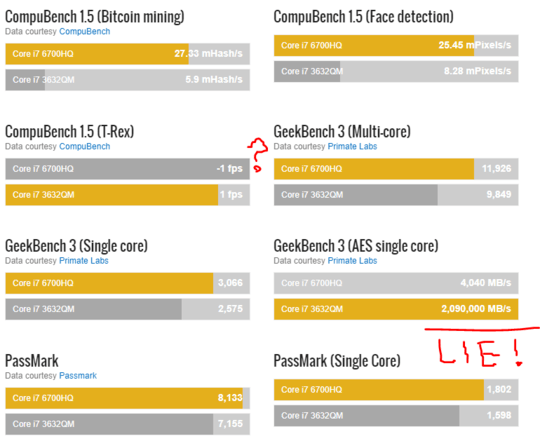-2
1
By "perform" I mean have better scores on websites like cpuboss.com or userbenchmark.com. Is that a bad metric, perhaps?
An example: my old laptop has i7 3632QM. New similarly priced laptops have [i7 6500U](i7 6500U). Here are the comparison: cpuboss.com comparison for Intel Core i7 6500U vs. Intel Core i7 3632QM
Note the advantage in the single core test.
Then I compared it to a modern quad core (i7 6700HQ): cpuboss comparison of Intel Core i7 6700HQ vs. Intel Core i7 3632QM
Now the score is closer, but the new processor consumes even more energy, 14 nm notwithstanding.
I'm quite confused, it makes it seem like there was no progress in 5 years.

5The i7-3632QM CPU was a performance-oriented CPU typically used in workstation-class laptops (notice the QM designation, these babies were supposed to be comparable to desktop CPUs). The i7-6500U is specifically engineered to consume very little power (notice the U desgination, meaning 'ultra-low power') while providing good-enough performance for office/web/media-consumption workloads. You're comparing apples and oranges here, and 5 years is not actually that long in CPU evolution (the era of massive performance gains between CPU generations is long gone). – misha256 – 2016-11-06T23:57:39.783
@misha256 what about i7-6700HQ, it consumes even more energy seemingly having no advantage. There must be some tasks where new CPUs are better, otherwise I don't see why anybody buys them. – mathquest – 2016-11-07T00:59:42.177
@misha256: wouldn't it be a better idea to have your comment as an answer as comments are rather reserved for information and or clarity on questions and answers? – nyedidikeke – 2016-11-07T01:01:14.383
@bors "no advantage" is not true, benchmarks do indicate some advantage... but not worth the money IMO. It is well known, among enthusiasts, that pure performance improvements since Intel's Sandy/Ivy Bridge have been minimal. Sure, newer CPUs perform a little bit better, and they have some extra features that modern OS' can utilize (e.g. accelerated cryptography and video encoding/decoding), and the "U" series CPUs are truly awesome in terms of power consumtpion, but that's about it. This is the world be live in today, mainstream CPUs are just not getting better as fast as they used to. – misha256 – 2016-11-07T01:51:37.153
@nyedidikeke this is a difficult question to answer authoritively and with good references so I'm just sticking to comments. – misha256 – 2016-11-07T01:53:45.710
@misha256 thank you for your answer. It's interesting about the slowed down growth. I hope the increasing complexity of software would not make the user experience worse with time. – mathquest – 2016-11-07T14:50:14.903
In this case: Because apples are not oranges, frankly. – music2myear – 2016-11-07T17:14:13.053